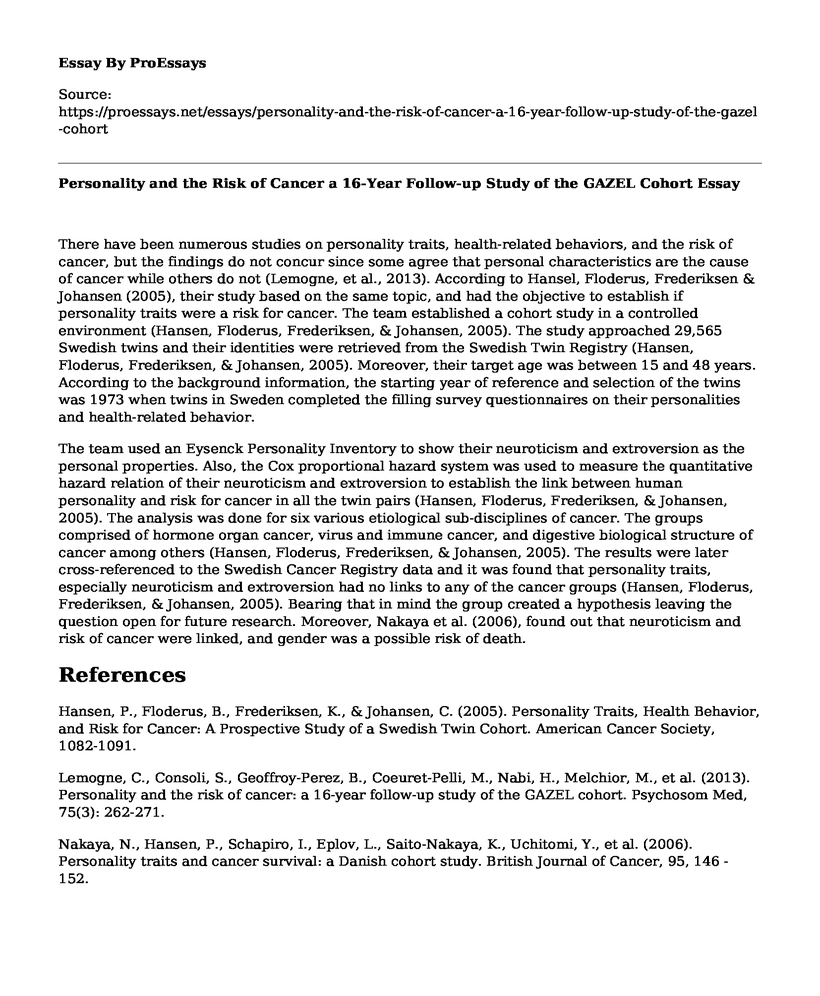There have been numerous studies on personality traits, health-related behaviors, and the risk of cancer, but the findings do not concur since some agree that personal characteristics are the cause of cancer while others do not (Lemogne, et al., 2013). According to Hansel, Floderus, Frederiksen & Johansen (2005), their study based on the same topic, and had the objective to establish if personality traits were a risk for cancer. The team established a cohort study in a controlled environment (Hansen, Floderus, Frederiksen, & Johansen, 2005). The study approached 29,565 Swedish twins and their identities were retrieved from the Swedish Twin Registry (Hansen, Floderus, Frederiksen, & Johansen, 2005). Moreover, their target age was between 15 and 48 years. According to the background information, the starting year of reference and selection of the twins was 1973 when twins in Sweden completed the filling survey questionnaires on their personalities and health-related behavior.
The team used an Eysenck Personality Inventory to show their neuroticism and extroversion as the personal properties. Also, the Cox proportional hazard system was used to measure the quantitative hazard relation of their neuroticism and extroversion to establish the link between human personality and risk for cancer in all the twin pairs (Hansen, Floderus, Frederiksen, & Johansen, 2005). The analysis was done for six various etiological sub-disciplines of cancer. The groups comprised of hormone organ cancer, virus and immune cancer, and digestive biological structure of cancer among others (Hansen, Floderus, Frederiksen, & Johansen, 2005). The results were later cross-referenced to the Swedish Cancer Registry data and it was found that personality traits, especially neuroticism and extroversion had no links to any of the cancer groups (Hansen, Floderus, Frederiksen, & Johansen, 2005). Bearing that in mind the group created a hypothesis leaving the question open for future research. Moreover, Nakaya et al. (2006), found out that neuroticism and risk of cancer were linked, and gender was a possible risk of death.
References
Hansen, P., Floderus, B., Frederiksen, K., & Johansen, C. (2005). Personality Traits, Health Behavior, and Risk for Cancer: A Prospective Study of a Swedish Twin Cohort. American Cancer Society, 1082-1091.
Lemogne, C., Consoli, S., Geoffroy-Perez, B., Coeuret-Pelli, M., Nabi, H., Melchior, M., et al. (2013). Personality and the risk of cancer: a 16-year follow-up study of the GAZEL cohort. Psychosom Med, 75(3): 262-271.
Nakaya, N., Hansen, P., Schapiro, I., Eplov, L., Saito-Nakaya, K., Uchitomi, Y., et al. (2006). Personality traits and cancer survival: a Danish cohort study. British Journal of Cancer, 95, 146 - 152.
Cite this page
Personality and the Risk of Cancer a 16-Year Follow-up Study of the GAZEL Cohort. (2022, Jul 03). Retrieved from https://proessays.net/essays/personality-and-the-risk-of-cancer-a-16-year-follow-up-study-of-the-gazel-cohort
If you are the original author of this essay and no longer wish to have it published on the ProEssays website, please click below to request its removal:
- The Diverse Population Course in Nursing Profession - Essay Sample
- Paper Example on Patient Information Management Program
- Plans in Creating Public Health Campaign Paper Example
- Essay Example on Digestion: Breaking Down Food for Provision of Energy
- Essay on Nutrition Therapy for Liver Cancer Patients: Examining Weight Loss and Appetite
- Achilles Tendon: Causes and Treatments - Research Paper
- Movie Review Example on Camp Crip: A Revolution for People with Disabilities







